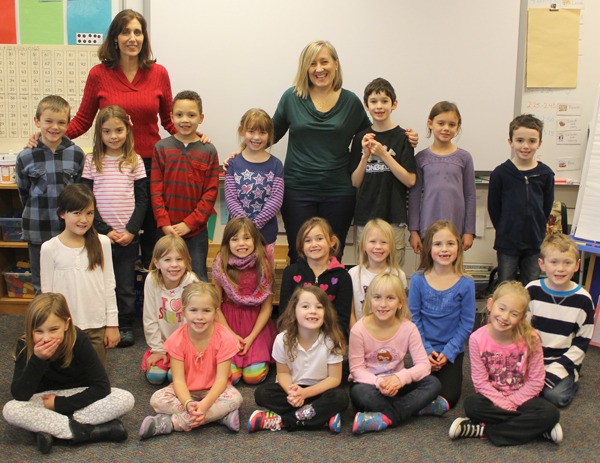Laura Spear felt she needed to make a change.
Spear, a social worker living in Enterprise, Ore., had spent the last several years visiting the homes of families in crisis, delivering curriculum to parents, many of whom had had their children removed from the home by Child Protective Services.
“I found that the children I was working with were not ready for kindergarten,” Spear recalled, expressing that she felt somewhat helpless as she was only able to spend about one hour a week with the kids.
“I felt like I could make a bigger impact with children if I was in the classroom,” said Spear. “I felt I could help educate, be supportive, be that person that they could count on, on a daily basis, and really instruct the children on how important education is.”
Seeking a new career in an isolated, rural area while raising two teens was no easy task. Despite the difficulty, Spear said it was the best decision she’d ever made.
She chose to attend Western Governors University, an online college. Though she said it would have taken her hours to commute to a brick-and-mortar institution, the online instruction afforded her enough flexibility to continue to work full time and, eventually, to move to Washington with little disruption in her coursework.
Spear recently finished her student teaching phase at South Whidbey Elementary School, where she worked in kindergarten and first-grade classrooms.
Western Governors University is a non-profit, competency-based online university headquartered in Salt Lake City, Utah. The university has a state branch in Washington, and the school is recognized as an accredited Washington state institution.
Spear said most of her peers were in her same age group, late-30s to mid-40s. Most, she said, had started traditional degrees at age 18, gone on to do other things, and were returning in pursuit of career change or advancement.
“It was a catalyst to make those dreams happen,” Spear said of the university.
Susie Richards, teacher success coordinator at the school, pointed out that much of the university’s student body is comprised of students who had previously started a degree at a different school but were unable to finish due to various circumstances, leaving them with sizable debt and no degree.
“They’re able to go back and finish … Folks can get a very high-quality education, at a hugely discounted cost compared to traditional universities — and do it from home,” Richards said. “The average age of our students is 38 years old, so it’s people [who] have this maturity and this life experience I think that just makes for such a strong group of folks.”
Richards began her career as a para-educator in the South Whidbey School District in the early 1990s and decided to earn her teaching certification. As a young mother, Richards recalled, she spent many hours commuting via bus from home to Antioch University in Seattle in order to gain her master’s degree and teaching certificate.
Richards said she “would have loved” to have had the opportunity to attend an online university such as WGU as opposed to spending so much time away from her family.
“It was tough with two young children,” she said. “But it was something I really wanted, so I did it.”
“I’m grateful that now we have this opportunity for members of the community who otherwise just wouldn’t have access,” said Richards.
Richards and Spear each remarked that WGU focuses on the “whole child” with comprehensive curriculum to assist teachers in learning to better support students.
The school’s online curriculum is supplemented by a “cohort facilitator” program in which students of the university who have entered the student teaching phase check in with a cohort facilitator via phone or Skype to check their progress and discuss their experiences. There are approximately 15 students in each cohort group. Prior to the student teaching phase, students also have a mentor with whom they collaborate from the first day of class through graduation.
“The unique thing that I really like about WGU is you’re completely surrounded with support,” said Spear. “There isn’t any time you feel you’re without that net. It’s a really rewarding feeling as a student.”
Spear noted that all of the professors and mentors are also teachers, another factor she found to be extremely helpful in her studies.
“It’s very comprehensive,” she said.
In October, WGU established a formal partnership with the South Whidbey School District. Through the partnership, all district employees are eligible to receive discounted tuition and institutional scholarships. Employees are also eligible to take part in no-cost professional development opportunities provided by the university.
Richards said WGU will be reaching out to other Washington school districts in hopes of establishing more partnerships similar to that with South Whidbey.
One of the objectives of the partnerships is to offer district employees, such as teacher assistants and para-educators, the opportunity to earn teaching certification when they otherwise may be unable to due to lack of funding or lack of time.
The arrangement, said Richards, is mutually beneficial for WGU and the school district as it would increase the number of available substitute teachers.
South Whidbey Elementary School principal Jeff Cravy, himself a WGU graduate, agreed, noting that “it’s been really tight” trying to secure substitutes within the last few years.
Cravy attended WGU several years ago in order to earn his master’s degree. He said he’s also looking into renewing some of his certifications through the university.
“I’m so appreciative of the relationship that WGU is forming with South Whidbey Elementary because the staff there is so amazing,” Spear said. “I learned so much from them as seasoned teachers and leaders … [Debra] Davies and [Suzanne] Haugen are both amazing and accomplished teachers. I definitely couldn’t have gotten through the program without their help and support.”



